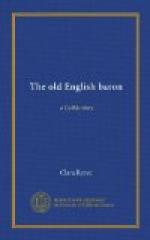a wild heath, where the people were inclosing the ground,
and making preparations for two combatants; the trumpet
sounded, and a voice called out still louder, “Forbear!
It is not permitted to be revealed till the time is
ripe for the event; wait with patience on the decrees
of heaven.” He was then transported to
his own house, where, going into an unfrequented room,
he was again met by his friend, who was living, and
in all the bloom of youth, as when he first knew him:
He started at the sight, and awoke. The sun shone
upon his curtains, and, perceiving it was day, he
sat up, and recollected where he was. The images
that impressed his sleeping fancy remained strongly
on his mind waking; but his reason strove to disperse
them; it was natural that the story he had heard should
create these ideas, that they should wait on him in
his sleep, and that every dream should bear some relation
to his deceased friend. The sun dazzled his eyes,
the birds serenaded him and diverted his attention,
and a woodbine forced its way through the window,
and regaled his sense of smelling with its fragrance.
He arose, paid his devotions to Heaven, and then carefully
descended the narrow stairs, and went out at the door
of the cottage. There he saw the industrious
wife and daughter of old Wyatt at their morning work,
the one milking her cow, the other feeding her poultry.
He asked for a draught of milk, which, with a slice
of rye bread, served to break his fast. He walked
about the fields alone; for old Wyatt and his two
sons were gone out to their daily labour. He was
soon called back by the good woman, who told him that
a servant from the Baron waited to conduct him to
the Castle. He took leave of Wyatt’s wife,
telling her he would see her again before he left the
country. The daughter fetched his horse, which
he mounted, and set forward with the servant, of whom
he asked many questions concerning his master’s
family.
“How long have you lived with the Baron?”
“Ten years.”
“Is he a good master?”
“Yes, Sir, and also a good husband and father.”
“What family has he?”
“Three sons and a daughter.”
“What age are they of?”
“The eldest son is in his seventeenth year,
the second in his sixteenth, the others several years
younger; but beside these my Lord has several young
gentlemen brought up with his own sons, two of which
are his nephews; he keeps in his house a learned clerk
to teach them languages; and as for all bodily exercises,
none come near them; there is a fletcher to teach
them the use of the cross-bow; a master to teach them
to ride; another the use of the sword; another learns
them to dance; and then they wrestle and run, and
have such activity in all their motions, that it does
one good to see them; and my Lord thinks nothing too
much to bestow on their education.”
“Truly,” says Sir Philip, “he does
the part of a good parent, and I honour him greatly
for it; but are the young gentlemen of a promising
disposition?”




